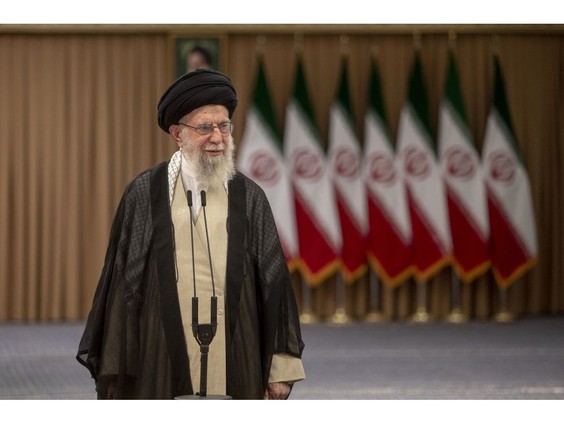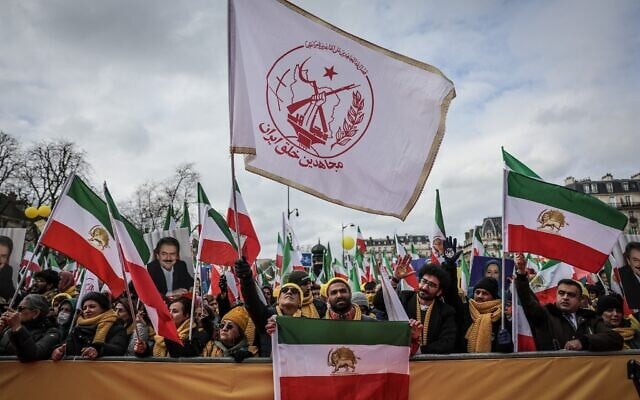The Oppressed People of Revolutionary Iran Amidst its Nuclear Threat
"[Negotiating with the United States would be neither] wise, intelligent nor honourable. Negotiating with such a government should not be done.""We must understand this correctly and not be misled into thinking that sitting at the negotiation table with that government will resolve certain matters. No, negotiations with the United States will not solve any problems.""They make statements about us, express opinions and issue threats. If they threaten us, we will threaten them. If they act on those threats, we will do the same. If they undermine our nation's security, we will undoubtedly respond in kind."Supreme Leader Ayatollah Ali Khamenei, Tehran, Iran
 |
| Ayatollah Ali Khamenei Photographer: Majid Saeedi/Getty Images |
The
Islamic Republic of Iran has for years suppressed the wishes of the
Iranian people to live fruitful lives without the interference of strict
medieval-era Sharia law that imposes restrictions on every aspect of
people's lives. Iranians have attempted time and again to convey their
wishes to the hardline Islamist government that the version of Islam
they have been forced to live under has made their lives a torment. The
advent of the return of former Grand Ayatollah Ruhollah Khomeini from
exile in 1979 and the downfall of the Shah of Iran introduced the
Iranian public to repression, subjugation and poverty of opportunities.
The
octopus arms of Revolutionary Iran that brought the dictatorship of a
theocracy intolerant of any sign of its population rejecting the
imposition of Islamist principles and practises under the watchful eyes
of the ruling mullahs and their military arm, the Islamic Revolutionary
Guard Corps, has diminished quality of life entirely for the population
they command. But the aspirations of the Islamic Republic goes well
beyond imposing their version of Islam on its citizenry. In forming a
sectarian alliance with other Shi'ite-led and majority governments,
Tehran aspires to transform the entire Middle East including
Sunni-majority nations into its satellites.
The
sole exception being the State of Israel -- whose presence on land
formerly 'consecrated' to Islam, irrespective of that land being
ancestrally the heritage of Judeans and current Israeli citizens --
destined, as far as the Iranian government is concerned, to be
destroyed. To that end, the al Quds division of the IRGC founded,
sponsored, armed, organized, trained and guided Islamist terrorist
groups whose primary function would be to attack and ultimately vanquish
the Israeli Defense Forces, and that done, destroy the Jewish state and
its Jewish inhabitants. Its proxy militia Hezbollah was conscripted
into the Republic's vision for that singular purpose. In tandem with
Hamas in Gaza and the Houthis in Yemen they formed a formidable threat
to Israel, fortified by Shi'ite militias in Iraq.
 |
| Iran said it is ready to negotiate with the United States over its nuclear program |
The
IRGC nuclear program that began with ever more advanced centrifuges
enriching uranium in hidden locations to the point where the creation of
nuclear bombs could be created to match the technological advances of
the short- and medium-range ballistic missiles that could be fitted with
nuclear heads, continues to concern Western intelligence agencies, and
certainly it does Israel. Iran's claims that its interest in nuclear is
restricted to domestic purposes is clearly a feint that fools no one. It
has made no secret of its intentions against Israel and its antipathy
to the United States.
"With me, it's very simple: Iran cannot have a nuclear weapon", said American President Donald J. Trump. Signing an executive order on Tuesday for the reimposition of "maximum pressure" sanctions on the Islamic Republic, Mr. Trump said he felt "torn" on signing the order. "It's very tough on Iran", he said, without doubt referring to the additional economic pressure imposed on an already flailing economy. "Hopefully we are not going to have to use it very much. I'm unhappy to do it"; not for any sympathy with the government, but empathy for the Iranian people living under economic hardships.
For
months prior to this latest setback for Iran, the Republic has been
signalling its readiness to re-engage in talks with the United States in
the interests of negotiating the issue of its rapidly advancing nuclear
program -- ostensibly in exchange for lifting crushing economic
sanctions draining billions of dollars from the Iranian economy. With
Khamenei's latest comments, the Iranian rial crashed to a record low of
872,000 rials to US$1 in aftermarket trading.
"The
Americans did not uphold their end of the deal. The very person who is
in office today tore up the agreement. He said he would, and he did",
complained Khamenei dolefully. Reformist President Masoud Pezeshkian on
Thursday promised dialogue with the West. Several days later Khamenei
contradicted that statement. While Iran's Foreign Minister stated that
Iran would never engage in talks under the kind of pressure the newly
imposed sanctions bear on the country.
Thousands of Iranians from across Europe rallied impressively in Paris on February 8,
urging world leaders to put more pressure on Iran’s ruling clerics."Instead of appeasing the mullahs, [the world] should stand side by
side with the Iranian people", Maryam Rajavi, president of the National
Council of Resistance of Iran (the political wing of the People's Mujahedin of Iran), told the rally. "We say your demise has arrived. With or without negotiations, with or
without nuclear weapons, uprising and overthrow await you", NCRI
President-elect Maryam Rajavi said.
 |
| Supporters of the People’s Mujahedeen of Iran wave a flag of their organization (C) along with Iran’s pre-revolution flag during a demonstration in Paris, on February 8, 2025, on the occasion of the 46th anniversary of the uprising against the Shah. (Thibaud MORITZ / AFP) |
Labels: Ayatollah Ali Khamenei, Islamic Republic of Iran, Nuclear Program, People's Mujhedeen of Iran, Sanctions, U.S. President rump, United States

<< Home